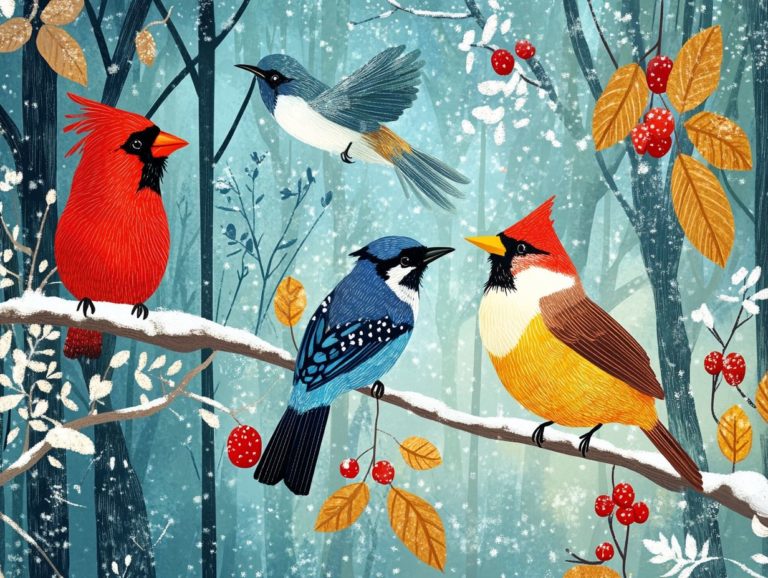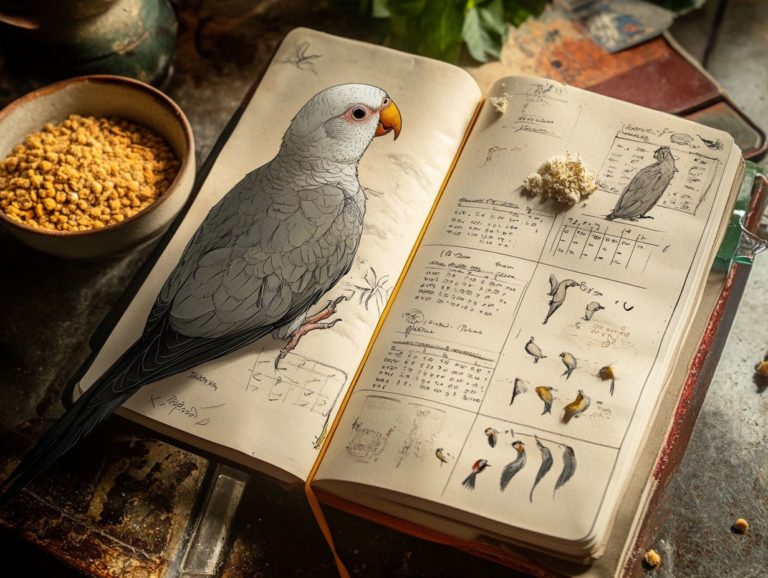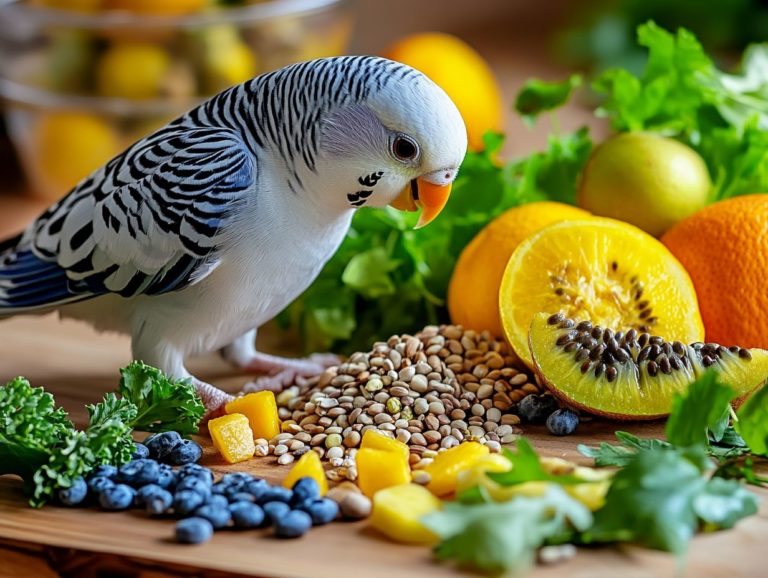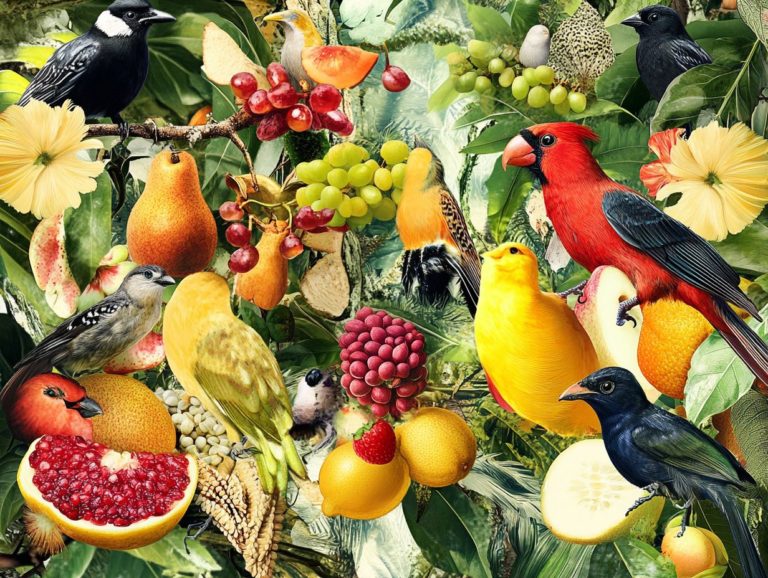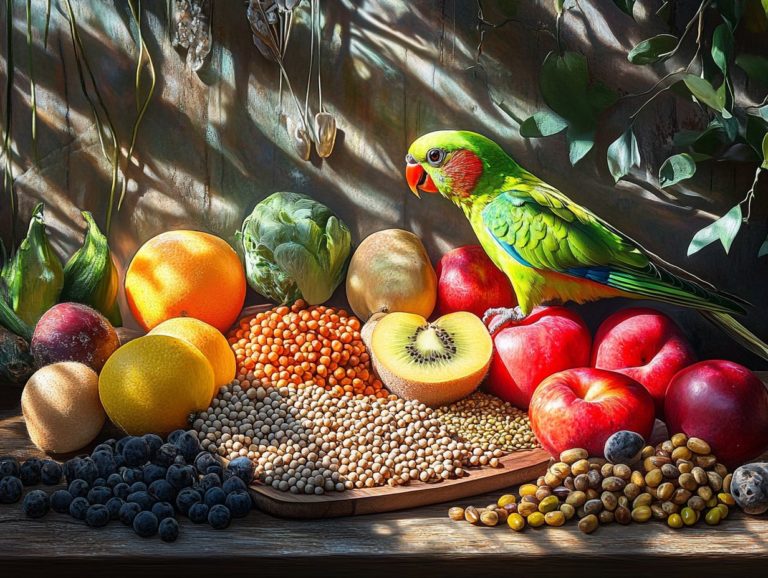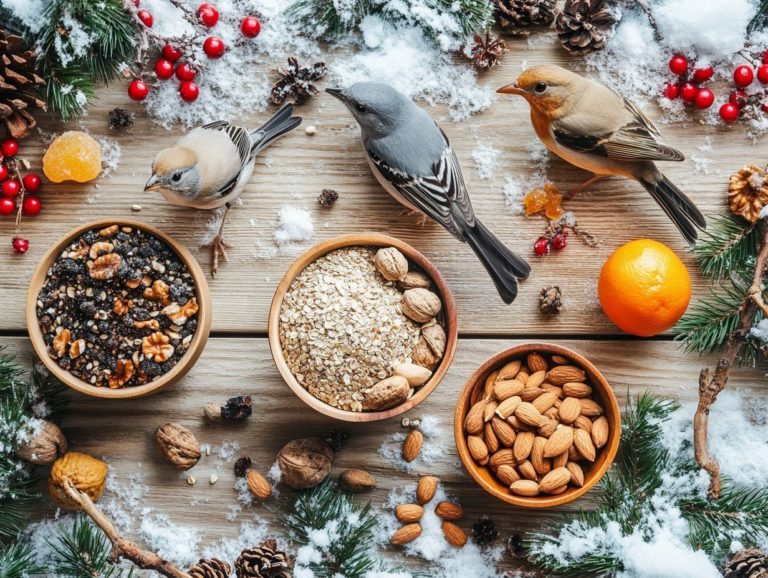The Best Calcium Sources for Birds
Calcium serves as an essential nutrient for birds, underpinning everything from robust bone health to vibrant feather growth.
Whether you are a seasoned bird owner or just beginning your journey, grasping how to provide your feathered companions with appropriate calcium sources is essential for their overall well-being.
Let s explore exciting calcium-rich foods that will keep your birds thriving! This article offers valuable insights on how to ensure your birds receive the ideal amount of this crucial mineral.
Discover the finest options to keep your avian friends flourishing!
Contents
- Key Takeaways:
- 1. Leafy Greens
- 2. Seeds and Nuts
- 3. Fortified Pellets
- 4. Dairy Products
- 5. Insects and Mealworms
- 6. Fruits
- 7. Eggshells
- 8. Grains and Legumes
- 9. Calcium Supplements
- 10. Cuttlebone
- 11. Oyster Shells
- 12. Mineral Blocks
- 13. Calcium-Rich Vegetables
- 14. Calcium Supplements for Breeding Birds
- 15. Calcium Supplements for Growing Birds
- How Much Calcium Do Birds Need?
- Frequently Asked Questions
- What are the best calcium sources for birds?
- Why is calcium important for birds?
- Can birds get enough calcium from their regular diet?
- How can I incorporate calcium sources in my bird’s diet?
- Are there any calcium sources that should be avoided for birds?
- Is Your Bird Lacking Calcium? Look for These Signs!
Key Takeaways:
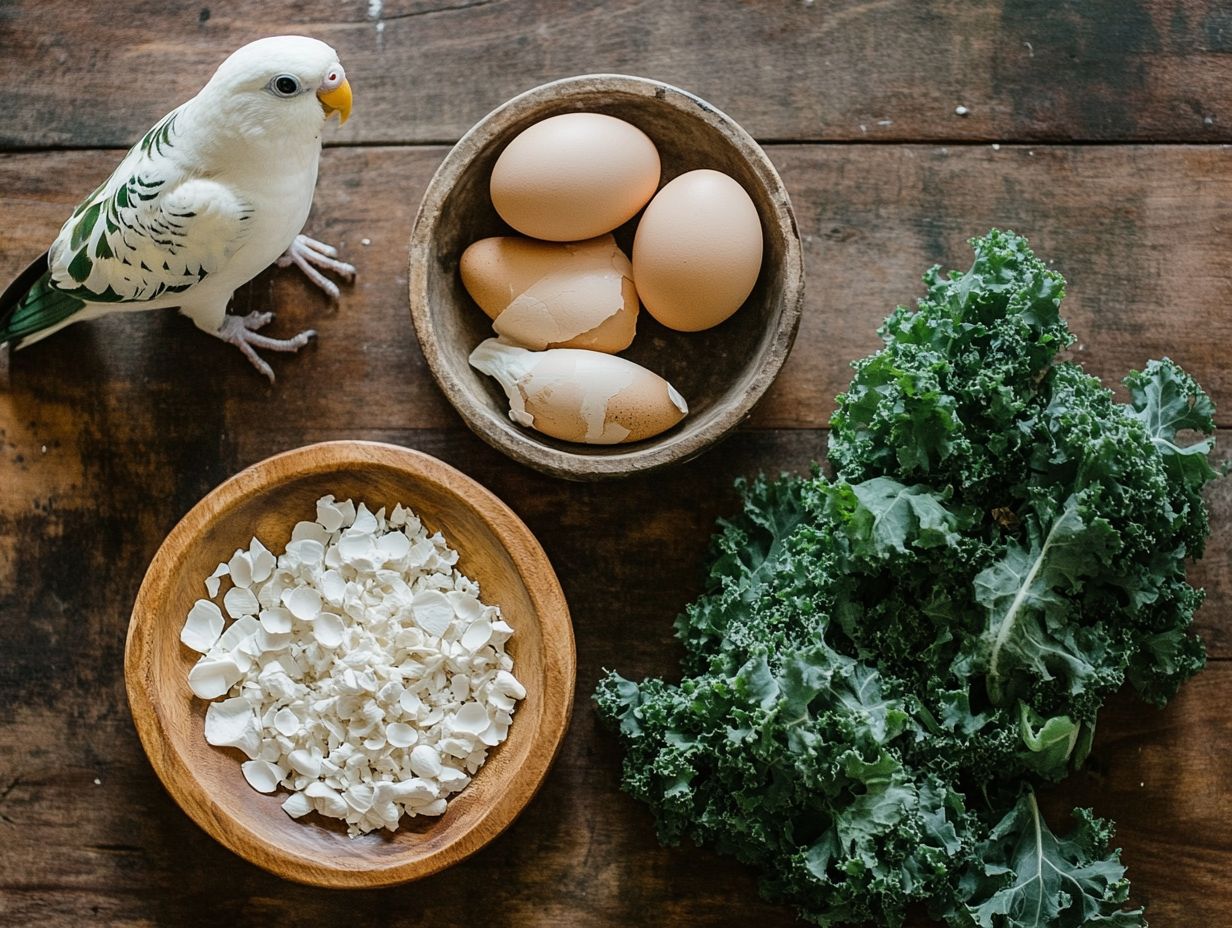
- Leafy greens, seeds, nuts, and fortified pellets are great sources of calcium for birds.
- Dairy products, insects, mealworms, and fruits also provide calcium.
- Calcium supplements like cuttlebone, oyster shells, and mineral blocks ensure your birds get enough calcium.
1. Leafy Greens
Leafy greens are absolutely essential in your bird’s diet, offering a natural source of calcium that supports optimal calcium levels crucial for their bone health and muscle movement.
This is especially important for species like the African Grey, which have specific dietary needs that must be met to prevent calcium deficiency and related health issues.
Beyond kale and broccoli, you ll find that greens like spinach and Swiss chard are also fantastic choices, each providing a unique mix of vitamins and minerals.
These greens are packed with antioxidants and fiber, playing a significant role in digestive health and overall vitality. Their high calcium content boosts absorption of this vital mineral, promoting strong bones and a healthy nervous system.
When you add leafy greens to your pet bird’s diet, remember to chop them into manageable pieces. This makes them more accessible and encourages your feathered friend to explore new flavors.
A varied diet that includes these greens not only meets nutritional needs but also stimulates mental engagement, turning mealtime into a fun and enriching experience.
2. Seeds and Nuts
Seeds and nuts aren t just tasty treats; they are essential, calcium-rich food sources that play a significant role in maintaining healthy calcium levels in birds.
When included in a well-rounded diet tailored to their unique needs, these foods can make a world of difference.
Take almonds and sesame seeds, for example. Both stand out for their exceptional nutrient profiles that promote calcium metabolism in avian species.
Almonds not only boast a high calcium content but also provide healthy fats vital for overall well-being. Sesame seeds, though small, are calcium-packed powerhouses, making them a fantastic addition to any bird’s diet.
When offering these nutritious snacks, it s wise to do so in moderation aim for them to comprise about 10-15% of a bird’s daily intake. This balanced approach ensures that birds receive the nutrition they need without overindulging in high-fat options.
3. Fortified Pellets
Fortified pellets serve as a convenient and nutritionally balanced choice for you as a bird owner, often packed with essential vitamins and minerals, including calcium, that support the overall health and well-being of your avian companions, like the African Grey.
Brands such as Harrisons, Roudybush, and TOPS offer specially formulated diets that ensure your feathered friends receive a comprehensive array of nutrients with ease.
These reputable brands prioritize the unique dietary needs of various species, providing higher levels of calcium and vitamin D3 to promote healthy bone growth and prevent conditions like metabolic bone disease.
By transitioning to fortified pellets, you can significantly reduce the time spent preparing fresh diets while ensuring that your birds receive all the necessary nutrients. This supports everything from feather quality to immune function, allowing you to focus more on the joy of bird ownership.
Don’t wait! Ensure your birds get enough calcium for happy, healthy lives. Start enhancing your birds’ diets today for a healthier, happier life!
4. Dairy Products
Dairy products can serve as an excellent source of calcium for birds. They offer essential nutrients that boost calcium intake when added thoughtfully to their diet, along with other vitamins and minerals essential for birds.
Consider incorporating yogurt and small amounts of cottage cheese. These dairy options elevate the nutritional profile, especially for egg-laying females who need extra calcium.
These foods support skeletal health and are vital for eggshell formation, reducing the risk of deformities.
Introduce dairy gradually to avoid digestive problems. Not all birds can digest lactose, a sugar found in milk.
Moderation is key; too much dairy can cause digestive issues or obesity. Choose appropriate dairy products to promote overall health.
5. Insects and Mealworms
Insects and mealworms are great sources of protein and calcium. They are valuable additions to the diets of many birds, including those in captivity.
These nutrients support muscle development and overall health. Calcium is especially important for bone strength and egg production.
Feed a variety of insects like crickets and waxworms to enhance their nutritional intake. Pairing insects with seeds, fruits, and vegetables creates a balanced diet.
This combination meets their dietary needs and mimics their natural feeding behaviors, promoting their well-being.
6. Fruits
Fruits are essential for bird nutrition, providing hydration and important vitamins. They also supply vital calcium for your birds.
These colorful foods boost overall health, particularly for species that need higher calcium, like budgerigars and cockatiels. Fruits like kiwi, oranges, and figs are delicious and nutrient-rich.
Variety is crucial; different fruits offer unique benefits. Mixing them ensures a well-rounded diet.
Remember, moderation is key. Too much sugar from fruits can lead to health issues. Balance fruits with other foods for optimal well-being.
7. Eggshells
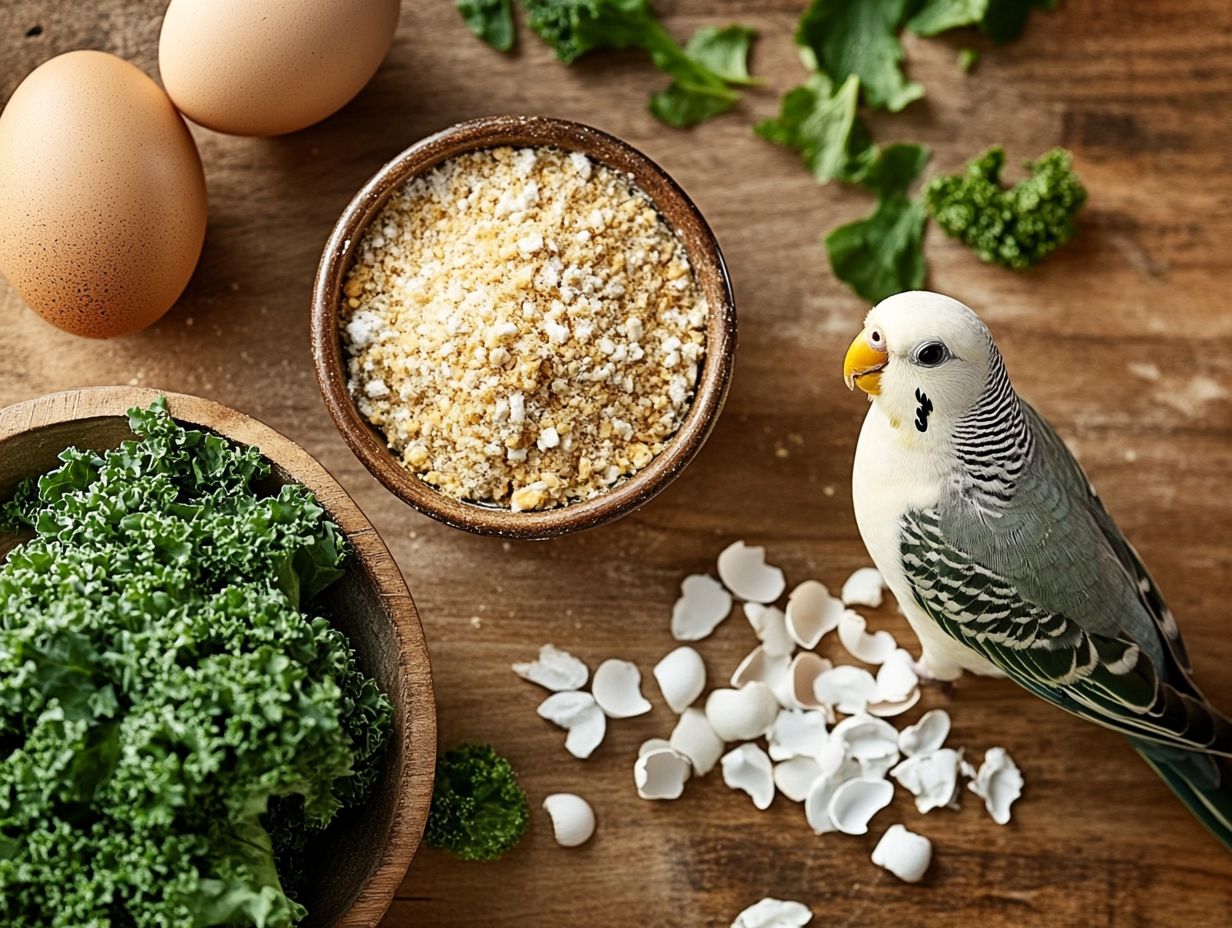
Eggshells are a natural and effective source of calcium for your birds. They enhance calcium intake and support healthy bones and eggshell formation, especially for breeding birds.
To prepare eggshells, rinse them thoroughly to remove residue and let them dry completely. Crush the dried shells into a fine powder or small pieces for easier consumption.
Introduce this calcium source gradually by mixing it with their regular food. The calcium helps strengthen bones and boosts overall health.
Monitor the amount you feed; moderation is essential to prevent dietary imbalances.
8. Grains and Legumes
Grains and legumes are essential staples in your avian friends’ diets, offering a wealth of nutrients and calcium-rich options that contribute to a well-rounded dietary intake.
Include quinoa, lentils, and chickpeas in their meals. These options enrich their diet with proteins and provide valuable sources of calcium. Quinoa, in particular, shines with its full range of proteins and impressive calcium content, making it an exceptionally beneficial choice.
Lentils are a powerhouse of fiber and protein, promoting overall digestive health. Chickpeas are also versatile, delivering both a protein boost and a variety of essential minerals.
By incorporating these grains and legumes into their diets, you can ensure that your feathered companions receive the vital nutrients they need for strong bones and radiant vitality. Try incorporating these grains into their diet today for healthier birds!
9. Calcium Supplements
Calcium supplements present a practical solution for bird owners like you, aiming to ensure your feathered friends receive the necessary calcium levels. This prevents health problems from not having enough calcium, such as hypocalcemia and muscle weakness.
You ll find various calcium supplements on the market, including calcium plus formulations that also provide additional vitamins and minerals beneficial for avian health. Many veterinarians who specialize in avian care endorse these supplements as they can significantly enhance your bird’s overall dietary intake.
It s essential for you to recognize the right moments to introduce these supplements into your birds diets especially during molting periods or breeding seasons, when their calcium needs can spike dramatically. This is especially important for species like the African Grey.
Utilizing powdered supplements mixed with food or offering chewable forms can greatly improve absorption, ensuring your feathered companions thrive and maintain strong bones. Give your birds the calcium boost they deserve for a happier, healthier life!
10. Cuttlebone
Cuttlebone is an exciting, natural source of calcium that you can easily incorporate into your bird’s diet, providing a straightforward way for them to boost their calcium intake while enjoying a delightful chewable treat.
This vital mineral is essential for maintaining strong bones, supporting muscle function, and ensuring overall health in your feathered companions. By adding cuttlebone to their diet, you can significantly enhance your pet s calcium levels, which is crucial during breeding and molting periods.
To offer this nutritious supplement effectively, place the cuttlebone in a secure and accessible spot within the cage, allowing your birds to peck at it whenever they fancy. Regularly swapping out any uneaten or soiled pieces will guarantee that your birds always have a fresh source of nutrition at their disposal.
11. Oyster Shells
Oyster shells serve as a remarkable source of calcium, making them a valuable addition to bird diets. They play a crucial role in supporting strong bones and promoting healthy eggshell formation, particularly for laying females who require elevated calcium levels.
Incorporating these shells into their diet can significantly enhance the overall health of your birds, providing essential minerals that contribute to their vitality. To prepare oyster shells for feeding, ensure they are thoroughly cleaned and then crushed into smaller pieces or ground into a coarse powder. This method makes it easier for your birds to consume and digest.
By balancing their diet with oyster shells, you’re helping your avian companions thrive. This not only delivers the calcium they need but also provides other vital trace minerals essential for their growth and development. Make sure to include oyster shells in their diet for optimal health!
12. Mineral Blocks
Mineral blocks are essential dietary tools for you to provide not just calcium but a diverse array of necessary minerals to your birds. This ensures they meet their dietary needs while in captivity.
These blocks typically feature a carefully crafted blend of vital minerals like phosphorus, magnesium, and trace elements such as zinc and copper. All of these play a crucial role in overall health. The varied composition is designed to mimic natural foraging behaviors, making these blocks not only appealing but also beneficial for your feathered friends.
By incorporating mineral blocks into their diets, you can effectively address health issues related to calcium deficiency, such as weakened bones and compromised egg production. Regular access to these blocks also promotes vibrant plumage and strengthens the immune system, helping your birds stay healthy and lively throughout their lives.
13. Calcium-Rich Vegetables
Calcium-rich vegetables like kale and broccoli are essential elements of your bird’s diet. They provide crucial nutrients that help maintain healthy calcium levels key for muscle movement and overall well-being.
Incorporating these greens into their meals can significantly enhance their nutritional profile. Consider adding Swiss chard and collard greens; they are also outstanding sources of calcium and pack additional vitamins A, C, and K, which are instrumental in feather growth and immune function.
Introduce a variety of these vegetables to keep their diet interesting and prevent any culinary monotony. Your birds will thrive on them raw, steamed, or chopped into smaller pieces, making it easier for them to access those vital nutrients.
Creating a vibrant garden of these greens not only boosts their calcium intake but also encourages lively foraging behaviors an essential aspect of mental stimulation and overall health.
14. Calcium Supplements for Breeding Birds
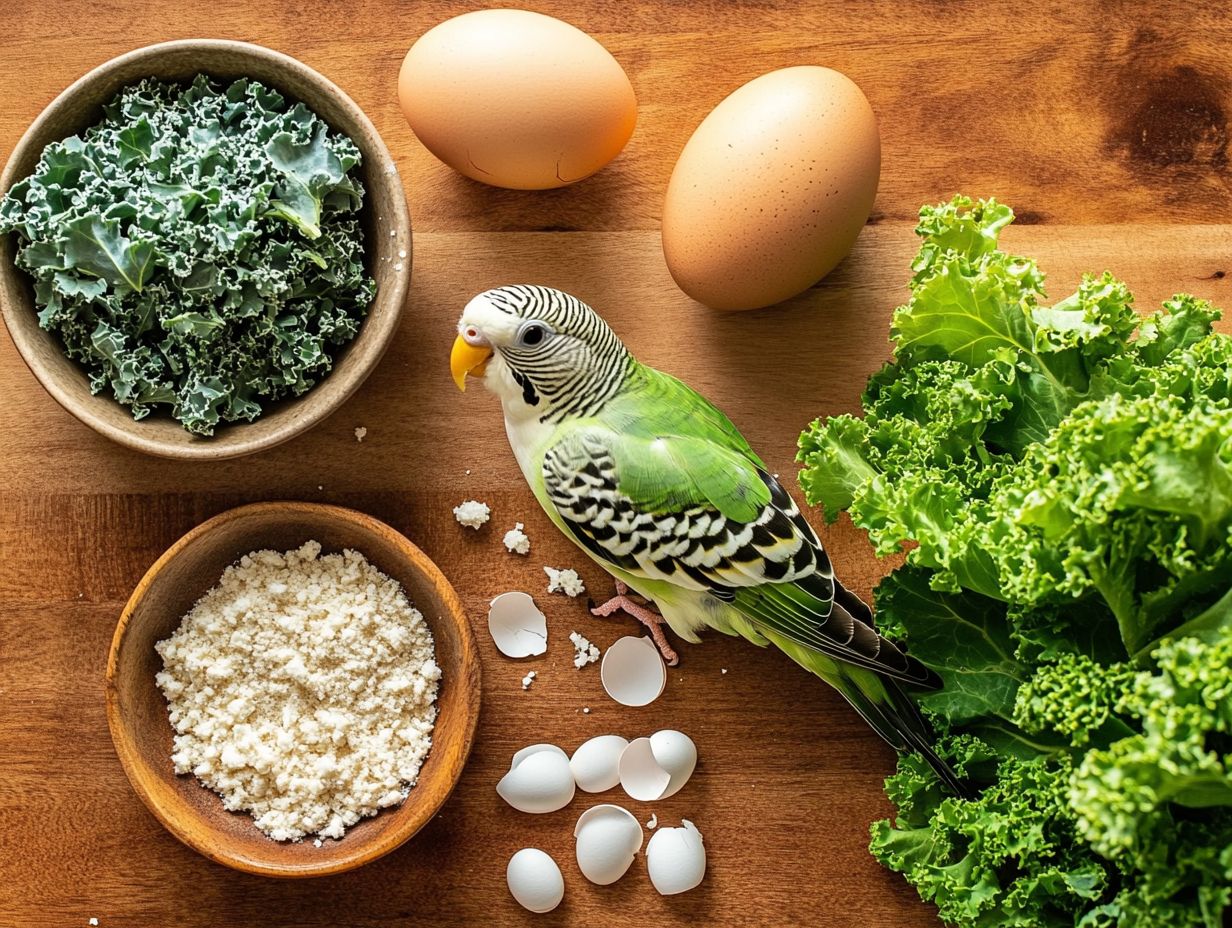
Breeding birds have elevated calcium needs. Calcium supplements are a vital component of their diet to support eggshell formation and overall reproductive health.
Calcium is essential not only for producing strong eggshells but also for muscle contraction and nerve function, both crucial during the demanding reproductive cycle. By thoughtfully selecting the right type of calcium supplements be it powdered form, calcium blocks, or liquid solutions you can specifically address your feathered companions’ unique requirements.
Consult a bird vet to determine the appropriate dosage based on your bird’s species, size, and breeding stage. Monitor their diet regularly to identify any deficiencies early, ensuring optimal conditions for breeding and nurturing healthy chicks.
15. Calcium Supplements for Growing Birds
Growing birds need an adequate intake of calcium for proper skeletal development. Calcium supplements are an essential part of their diet to prevent health issues like muscle weakness and hypocalcemia.
Ensuring these young avians receive the right type of calcium can significantly influence their growth and overall health. Various forms of calcium supplements are available, such as calcium carbonate, calcium citrate, and even natural options like crushed eggshells or cuttlebone. Each type offers unique benefits, including improved absorption or valuable trace minerals.
Integrating these supplements into their daily feeding routine is quite simple. Mix a small amount into their favorite food or offer a separate calcium-rich treat, encouraging them to consume what they need to thrive.
Give your birds the best chance at a vibrant life with these nutrient-rich options!
How Much Calcium Do Birds Need?
Determining how much calcium your birds need is essential for maintaining their health. Different species, such as the African Grey, have varying calcium requirements influenced by factors like age, reproductive status, and overall health.
Younger birds and those breeding need more calcium for growth and egg production. Meanwhile, older birds may require adjustments based on their activity levels and potential health issues. Bird doctors frequently recommend a diet rich in dark leafy greens, fortified pellets, and sometimes supplements to meet these needs.
To ensure your feathered companion is getting enough calcium, keep an eye out for signs of lethargy, feather plucking, or changes in egg quality these could all signal deficiencies. Regular health check-ups can provide you with valuable insights and customized dietary recommendations to keep your birds thriving.
What Are the Signs of Calcium Deficiency in Birds?
Recognizing the signs of calcium deficiency in your birds is crucial for timely intervention. Symptoms such as muscle weakness, low calcium levels, and behavioral changes can all indicate that calcium levels are inadequate.
You might see symptoms like trembling, difficulty in perching, or even seizures, which can understandably alarm any caregiver. It’s essential for you to keep a close eye on your bird s dietary intake, as a lack of calcium-rich foods can worsen these health issues.
Pay attention to your feathered friend’s interaction patterns; changes in vocalization, lethargy, or increased irritability can provide vital clues about their well-being. By implementing regular health check-ups and behavioral assessments, you can significantly enhance the quality of life for your avian companions, ensuring they thrive in a healthy environment.
Are There Any Risks of Over-Supplementing Calcium for Birds?
While calcium is essential for birds, over-supplementing can lead to serious health problems, such as kidney issues and disruption of calcium metabolism. This underscores the importance of maintaining a balanced dietary intake.
If you re not aware of the appropriate calcium levels, you could inadvertently create complications, including lethargy and even cardiovascular problems. Signs of excess calcium may manifest as abnormal feather growth or changes in behavior, which can indicate underlying health disturbances. As a bird owner, staying vigilant is your key to ensuring your bird’s health!
Consulting with a bird doctor can offer you personalized guidance on your bird’s nutritional needs, helping you establish an appropriate supplementation plan that enhances overall well-being while steering clear of the pitfalls of over-saturation.
How Can Bird Owners Ensure Their Birds Are Getting Enough Calcium?
As a bird owner, you can ensure your feathered companions are getting the calcium they need by incorporating a variety of calcium-rich foods, keeping a close eye on their d dietary intake, and consulting with a bird doctor for personalized guidance.
A balanced diet is essential for maintaining strong bones and overall health in birds. Consider introducing dark leafy greens, like kale and collard greens, along with fortified pellets that deliver crucial nutrients. Offering fruits such as oranges and figs can also elevate calcium levels. To further enhance their intake, you might explore supplement options like cuttlebone or calcium-fortified foods just don t forget to provide fresh water.
Monitoring for signs of calcium deficiency is imperative; keep an eye out for symptoms like soft-shelled eggs or lethargy. Regular check-ups will help you assess whether their current dietary regimen is up to par.
What Are the Benefits of a Calcium-Rich Diet for Birds?
A calcium-rich diet offers many benefits for birds. These include stronger bones, improved muscle function, and enhanced eggshell formation.
Maintaining good calcium levels is crucial for many body processes. For example, insufficient calcium can cause weakness or lethargy, making it hard for birds to forage or escape predators.
Calcium is especially vital during the breeding season. Female birds need higher levels to produce strong eggs that support their developing chicks.
A balanced calcium intake also helps with vocalization and activity levels. It plays a key role in avian vitality and behavior.
Frequently Asked Questions
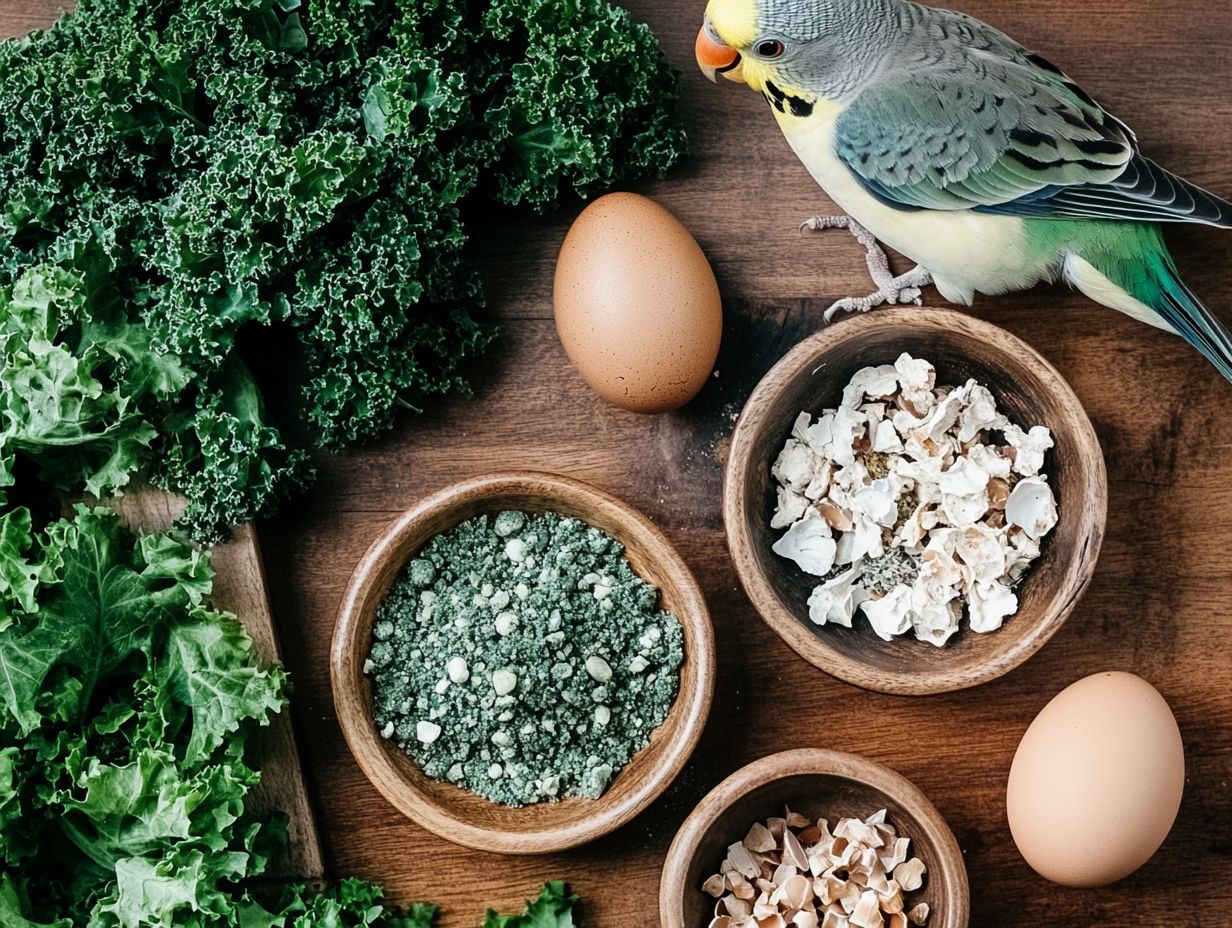
What are the best calcium sources for birds?
The best calcium sources for birds include leafy greens such as kale and collard greens, fortified seeds, eggshells, and cuttlebone.
Why is calcium important for birds?
Calcium is essential for birds as it helps maintain strong bones and beaks, aids in muscle contractions, and is necessary for proper nerve and cellular function.
Can birds get enough calcium from their regular diet?
It is possible for birds to get enough calcium from their regular diet, but it is important to supplement their food with additional calcium sources to ensure proper intake.
How can I incorporate calcium sources in my bird’s diet?
You can incorporate calcium sources in your bird’s diet by offering them as treats or mixing them with their regular food. You can also provide a cuttlebone for them to nibble on.
Are there any calcium sources that should be avoided for birds?
Yes, dairy products, raw or cooked beans, and spinach should be avoided as they can interfere with calcium absorption in birds.
Is Your Bird Lacking Calcium? Look for These Signs!
Signs of calcium deficiency in birds include weak or brittle bones, poor egg production, egg binding, and muscle tremors. If you suspect calcium deficiency, act quickly and consult a veterinarian!

